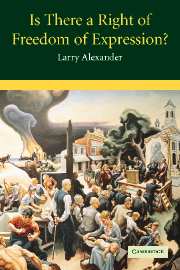Book contents
- Frontmatter
- Contents
- Acknowledgments
- Introduction
- PART ONE DEFINING HUMAN RIGHTS AND DELIMITING THE SCOPE OF FREEDOM OF EXPRESSION
- PART TWO THE CORE OF FREEDOM OF EXPRESSION: GOVERNMENT REGULATIONS AND ACTS TAKEN TO AFFECT MESSAGES
- 4 The Core of Freedom of Expression: Regulations of Conduct for the Purpose of Affecting Messages Received
- 5 Track Three: Government Speech and Subsidies of Speech
- 6 Miscellaneous Regulations of Expression
- PART THREE THEORETICAL PERSPECTIVES ON FREEDOM OF EXPRESSION
- EPILOGUE
- Index
5 - Track Three: Government Speech and Subsidies of Speech
Published online by Cambridge University Press: 07 January 2010
- Frontmatter
- Contents
- Acknowledgments
- Introduction
- PART ONE DEFINING HUMAN RIGHTS AND DELIMITING THE SCOPE OF FREEDOM OF EXPRESSION
- PART TWO THE CORE OF FREEDOM OF EXPRESSION: GOVERNMENT REGULATIONS AND ACTS TAKEN TO AFFECT MESSAGES
- 4 The Core of Freedom of Expression: Regulations of Conduct for the Purpose of Affecting Messages Received
- 5 Track Three: Government Speech and Subsidies of Speech
- 6 Miscellaneous Regulations of Expression
- PART THREE THEORETICAL PERSPECTIVES ON FREEDOM OF EXPRESSION
- EPILOGUE
- Index
Summary
Laurence Tribe labeled the judicial treatment of laws that restrict liberty in order to affect messages – the content-based regulations that were the subject of the previous chapter – Track One free speech jurisprudence. And he labeled the judicial treatment of laws that restrict liberty for reasons other than to affect messages – the content-neutral regulations that were the subject of Chapter Two – Track Two free speech jurisprudence. Tribe did not describe any other “Tracks.” There is, however, at least one more. Track Three consists of all the governmental acts that provide aid to a particular viewpoint but that in themselves do not appear to restrict anyone's liberty.
In this chapter I shall examine Track Three laws and governmental acts. (Hereinafter I shall refer to all Track Three governmental acts as “laws” purely for convenience.) My conclusions are these: Track Three laws turn out to be ubiquitous and potentially quite extensive in scope. Their judicial treatment when challenged on free expression grounds has been a muddle, with courts sometimes striking down and sometimes upholding laws that seem indistinguishable on freedom of expression grounds. And, most importantly, the generally accepted distinction between Track Three laws and Track One laws, namely, that the latter but not the former represent restrictions on liberty, turns out to be wrong. Track Three laws do restrict liberty, and in some circumstances they may do so as much as Track One laws.
- Type
- Chapter
- Information
- Is There a Right of Freedom of Expression? , pp. 82 - 102Publisher: Cambridge University PressPrint publication year: 2005



